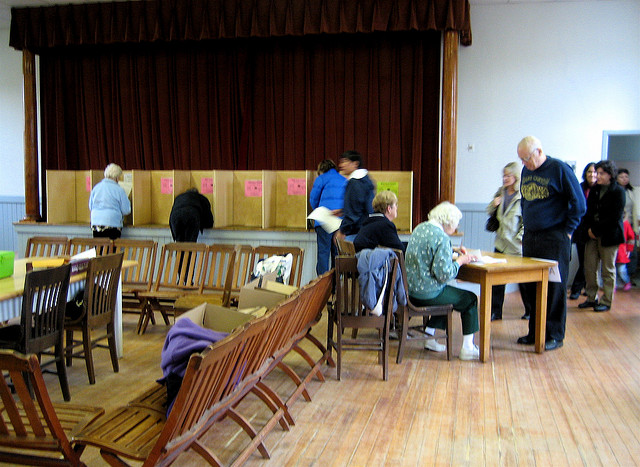Wales should change the electoral system used to elect councillors as part of local government reforms
Local government reform is firmly on the Welsh political agenda. This presents an opportunity, suggests Roger Scully, to reform the way councillors are elected. In this post he argues that the predominant electoral system in use in Wales and in England – a form of first past the post termed Multi-Member District Plurality – should be abandoned because it lacks the simplicity and proportionality of other systems.

Roger Scully argues the current method of electing councillors needs replacing. Credit: muffet (CC BY 2.0)
The publication of the Williams Report – from the Welsh Government’s Commission on Public Service Governance and Delivery – has prompted lots of discussion about the future of local government in Wales. Williams has recommended mergers of many current councils, and a significant overall reduction in the number of local authorities from the current 22. The report makes strong arguments for the potential benefits of council mergers.
Like just about everyone, I agree that if you were starting with a blank sheet of paper, you almost certainly wouldn’t design a local government system for Wales that included 22 local authorities. Nonetheless, I am also a little cautious about the Williams proposals. Plentiful adjustments to local government boundaries and organisation in the UK in the last half-century have not obviously produced enormous benefits. While the latest blue-print for change does seem more solidly evidence-based than some previous ones, we may also want to remember the strong and consistent finding in business studies research: mergers tend to substantially under-deliver on anticipated benefits.
Nonetheless, some change is probably on the way. And one topic that has already arisen in discussions about implementing Williams is how any new local authorities would be elected. There have been suggestions that support for implementation of Williams from both Plaid Cymru and the Welsh Liberal Democrats might be conditional on reform to the electoral system used for Welsh local elections. Both Plaid and the Lib-Dems support the use of the Single Transferrable Vote (STV) in multi-member constituencies. This is the system used in Scottish local elections since 2007, and recommended for use in Wales by the majority of the Sunderland Commission in 2002.
STV would represent a substantial change to how we currently elect our councils. In the 2012 local elections (i.e., not including Ynys Môn) there were a total of 880 council wards in Wales, electing 1,221 seats. Of those, 580 (66%) were single member wards; there are 162 (18%) two member wards; 76 (9%) three member wards; 20 (2%) four member wards; and two five member wards (Morriston and Sketty both on Swansea). All wards chose their councillors (except in those seats that went uncontested) through some form of categorical, plurality voting.
In the single-member wards, councillors were elected via the Single-Member District Plurality system (SMDP, commonly known as first past the post). Multi-member wards, through which the majority of councillors were chosen, used what might be termed Multi-Member District Plurality (MMDP): here, voters are given X categorical votes, X being equal to the number of council seats to be elected, and the X people with the most votes in each ward are those elected.
The virtues and vices of SMDP have been discussed numerous times (including on the Elections in Wales blog). Among the suggested virtues are simplicity and familiarity. There are also some arguments in favour of single-member districts: notably that they can be kept relatively small in size; and that there is a direct link between a single, individual representative and her/his area. If one is going to choose councillors from single-member wards, then SMDP is a perfectly defensible system to use. Personally I would marginally favour the Alternative Vote system, but there probably isn’t a great deal in it either way, and the simplicity and familiarity of SMDP do weigh in its favour.
MMDP is quite another matter, however. This is a system that combines all the vices of SMDP with none of the redeeming features. The use of multi-member wards means that what some defenders of SMDP for Westminster have termed the sacred bond between the single representative and their district is lost. The simplicity of SMDP – one person, one categorical vote – is also abandoned. At the same time, the principal vice of SMDP is maintained (even, in some scenarios, enhanced): the substantial, at times outrageous, disproportionality between the votes of the people and the party balance of the representatives who are elected. It is far from unknown for one party to win 100% of the representation from a multi-member ward on a minority (sometimes quite a narrow minority) of the vote. Repeated across different wards, this can make particular councils grossly imbalanced – at times looking almost like ‘one-party states’ – on a minority of the vote. MMDP is quite possibly the worst electoral system currently in use anywhere in the world. It is understandable that no Sunderland Commission member favoured retaining this system.
Implementation of Williams would, presumably, mean cutting Wales’ currently excessive number of councillors. (We have almost exactly the same number as in Scotland, despite being much smaller both in territory and population.) Council wards would need to be re-drawn. The introduction of new wards for new councils would seem to be an ideal time to also introduce any new voting system. While the mixture of SMDP and MMDP currently used may be the ‘default’ option, I very much hope that the case for STV is re-visited. STV would promote greater proportionality; the make-up of councils would represent popular views more accurately than under the current system. There would thus be far fewer one-party states (unless the voters had chosen to give a single party an overwhelming mandate).
There may be other virtues to STV as well. The elections would be more likely to be genuinely competitive. In 2012, 8.0% of council seats in Wales went uncontested; in Scotland, where STV was used for the simultaneous council elections, there were no uncontested seats. Studies of STV where it has been used also find that it tends to promote strong local representation: the possibility of having to compete with other candidates from one’s own party, as well as those from others, and the need to win lower preferences if not the first preference of voters, places a high premium on local visibility and the personal reputations of representatives. In the context of a reform of local government that may well make councils appear more distant to some people, this is of value.
Reform of local government in Wales is very much on the agenda now. One valuable reform would be to get rid of the system by which the majority of our current councillors are elected – a system that is a strong contender for the title of the worst electoral system in the world.
—
Note: This post was originally published on the Elections in Wales blog. It represents the views of the author and does not give the position of Democratic Audit or the LSE. Please read our comments policy before commenting. Shortlink for this post: buff.ly/1ns0RCp
—
 Roger Scully is Professor of Political Science in the Wales Governance Centre at Cardiff University. He is the co-author of Wales Says Yes: Devolution and the 2011 Welsh Referendum (University of Wales Press, 2012), and was Director of the ESRC-funded 2011 Welsh Referendum Study and 2011 Welsh Election Study. He blogs at Elections in Wales and tweets @roger_scully.
Roger Scully is Professor of Political Science in the Wales Governance Centre at Cardiff University. He is the co-author of Wales Says Yes: Devolution and the 2011 Welsh Referendum (University of Wales Press, 2012), and was Director of the ESRC-funded 2011 Welsh Referendum Study and 2011 Welsh Election Study. He blogs at Elections in Wales and tweets @roger_scully.







 Democratic Audit's core funding is provided by the Joseph Rowntree Charitable Trust. Additional funding is provided by the London School of Economics.
Democratic Audit's core funding is provided by the Joseph Rowntree Charitable Trust. Additional funding is provided by the London School of Economics.
I was rather surprised and disappointed that this contribution dropped straight into the ‘STV rut’ without consideration of at least one very obvious better option.
No bottom-up-only electoral process (such as SMDP, FPTP, AV, SV, MMDP or STV) gets anywhere near full-proportionality (STV in the Scottish local authorities is an average of 10% short of full proportionality). AMS (Additional Member System) makes good the demographically-distorted makeup of de-facto bottom-up local representatives, and addresses the requirement for fully-proportional representation, through top-up representatives.
For illustration of this claim, see the following:
1. Making Votes Count, Patrick Dunleavy et al, Democratic Audit, 1997.
2. Making Votes Count 2, Patrick Dunleavy et al, Democratic Audit, 1998.
3. The Jenkins Report 1998 (an analysis of the relative merits of many systems, considering and rejecting STV, and deciding in favour of AV+ – ‘AMS-Light’).
4. The Politico’s Guide to Electoral Reform in Britain, Patrick Dunleavy et al, Politico’s Publishing, 1998, etc..
5. A Guide to Voting Systems, Anna Killick, Charter 88, February 1998, Pages 3 & 16.
6. A Guide to Voting Systems in the UK, Angela Smith-Hughes, Charter 88, September 1999, Pages 3 & 16.
7. The deliberations leading to the Scottish, Welsh and London arrangements (each including an analysis of the relative merits of many systems, considering and rejecting STV, and deciding in favour of AMS).
8. A Citizen’s Guide to Electoral Reform, Alan Renwick, Biteback, 2011 (including an analysis of the relative merits of many systems, without deciding in favour of any particular system).
9. 2012 Scottish Local Government Elections, Professor John Curtis, ERS, May 2012, Page 20.
10. ERS AGM 2013 presentation on the 2012 Scottish Local Government Elections by Professor David Denver.
11. ERS AGM 2013, comments from the floor.
Indeed, a more open-minded consideration of the options would suggest that an AMS-50/AV process would be ideal (i.e. a process in which 50% of Representatives would be appointed by an AV vote transferable through all Candidates in each of a number of single-representative geographic sub-constituencies, and in which the remaining 50% of Representatives would be appointed by an AMS electoral processes to achieve overall representation truly-proportional to the Party preferences of the electorate).
To discuss options for electoral reform without considering such an option is like comparing the relative merits of candle lighting (FPTP) and gas lighting (STV), when the whole world has already moved on to electric lighting.
Roger Scully on the “worst electoral system in the world” (ie the way most of us elect our local councillors) https://t.co/ryMuTv71Xl
Wales should reform voting system for council elections says @roger_scully on @democraticaudit https://t.co/8MeGdmkf2c
Wales should reform the system used to elect councillors as part of local government reforms by Roger Scully https://t.co/4t6QRrThew
Wales should reform the electoral system used to elect councillors as part of local government reforms https://t.co/TeFlFjeWGG